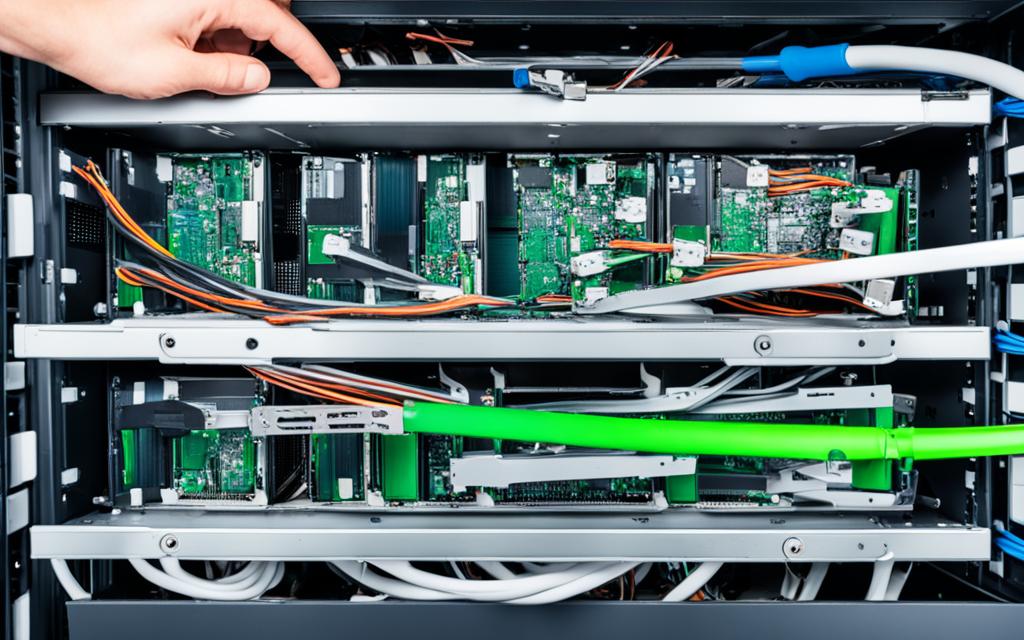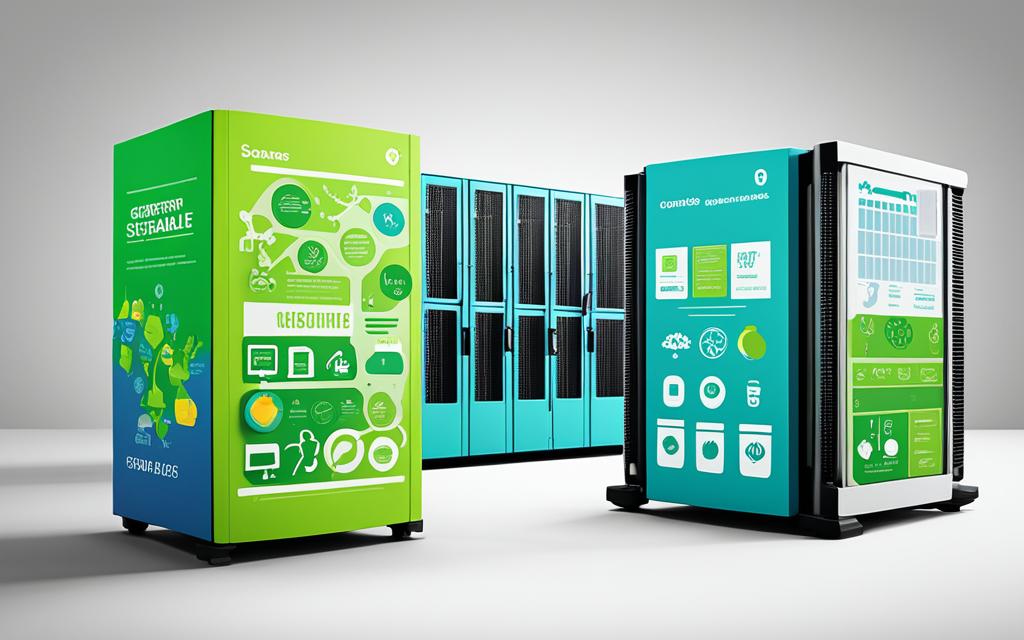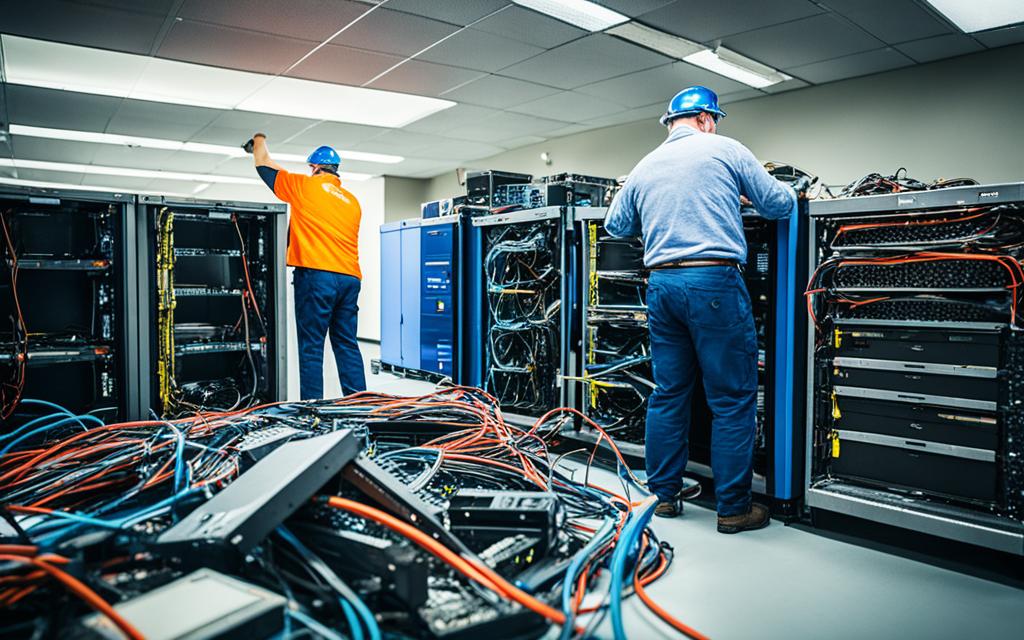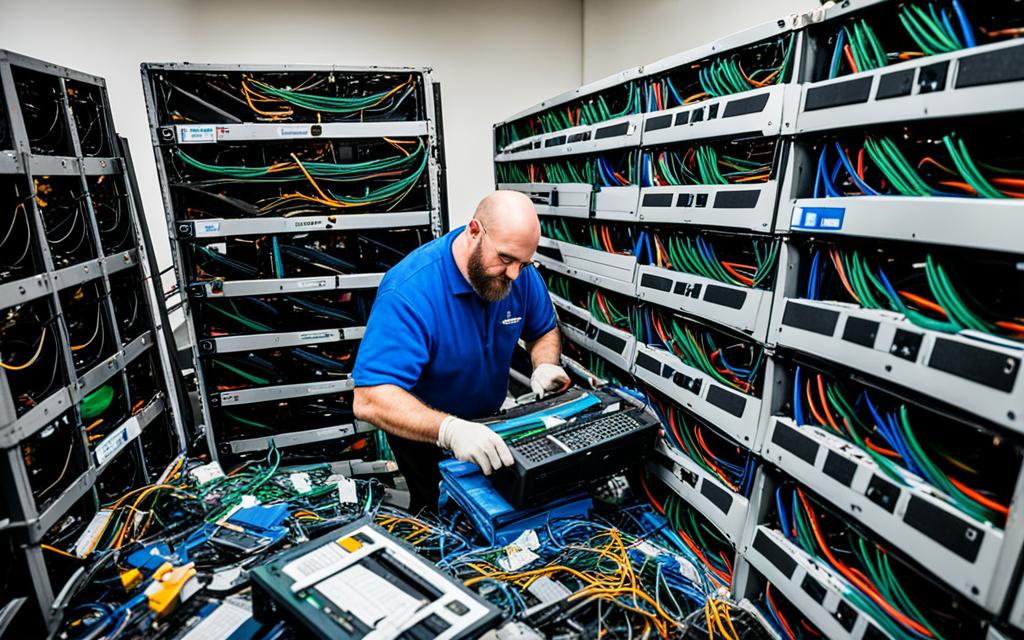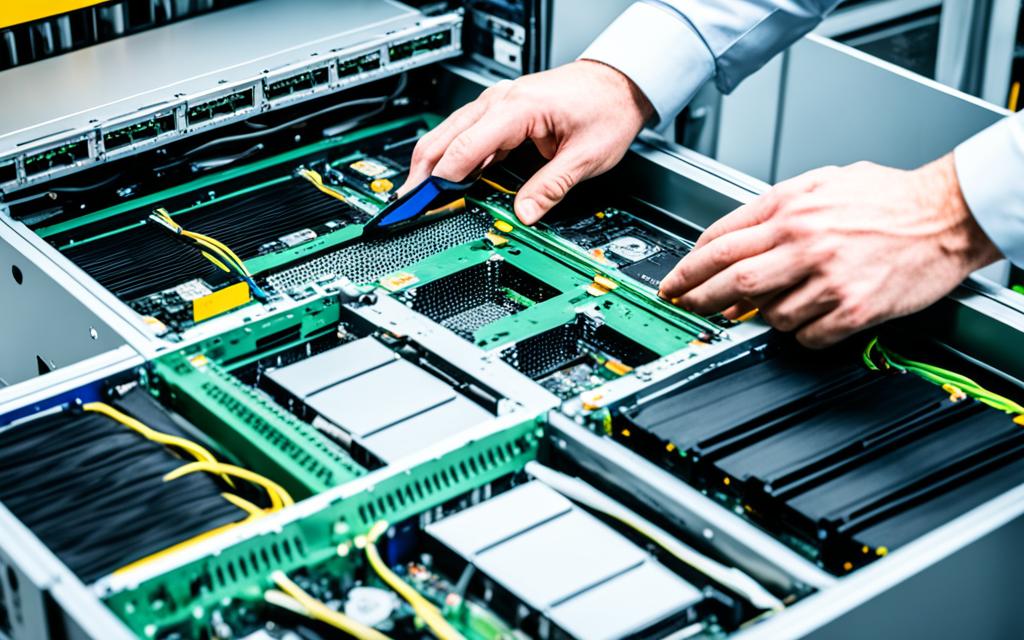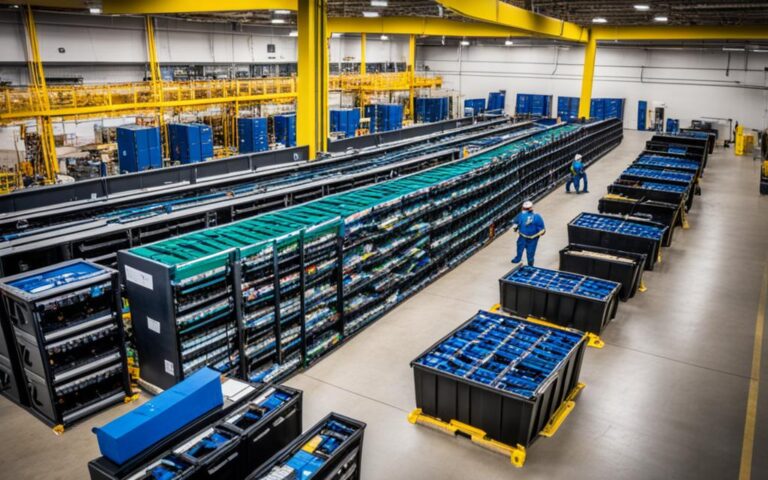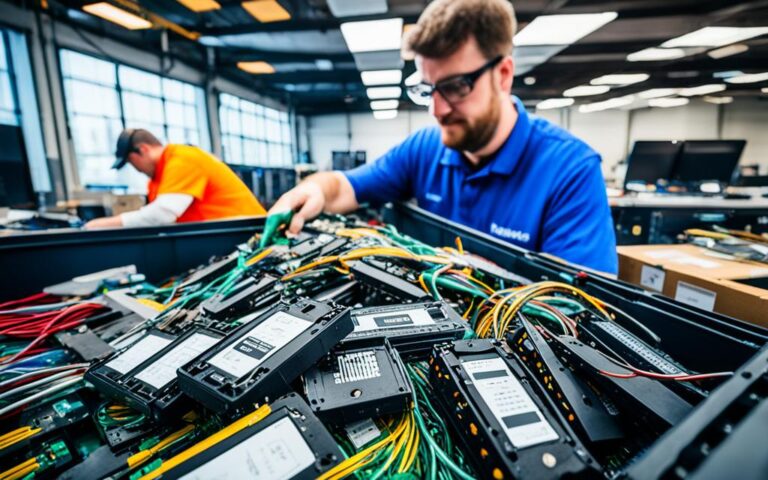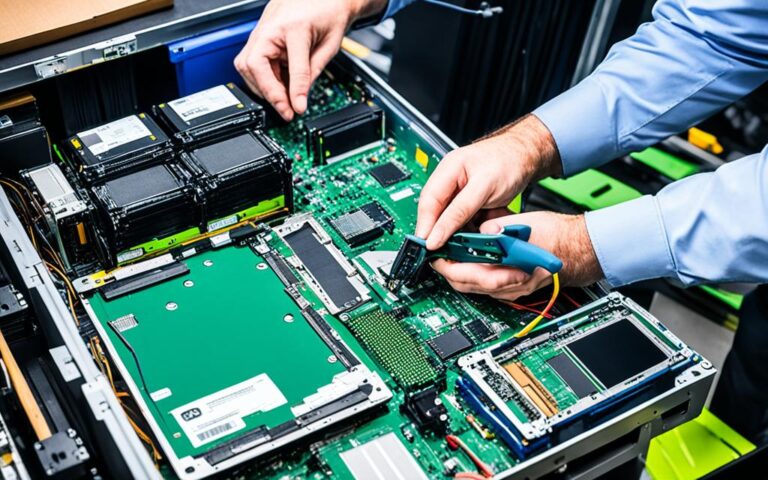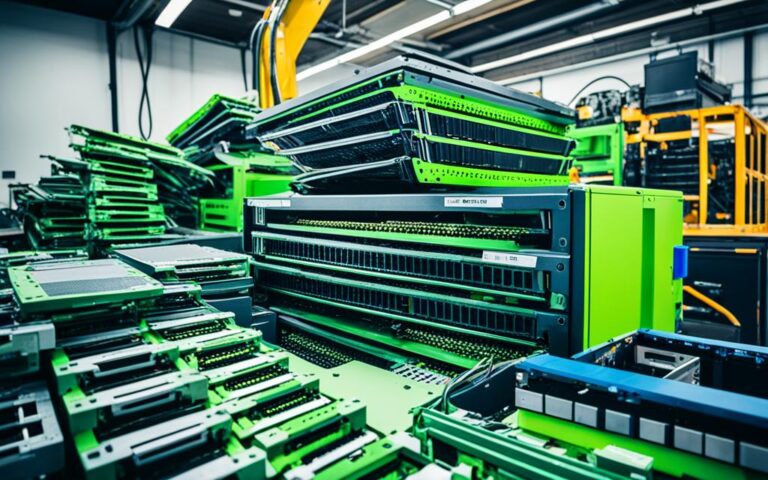The Role of Server Recycling in Reducing Resource Consumption
Server recycling is not just a responsibility, it’s an opportunity to create a sustainable future. In today’s digital age, businesses and institutions are constantly upgrading their IT infrastructure, leading to a significant resource consumption. However, server recycling holds the key to reducing this consumption and building sustainable IT ecosystems.
Proper server disposal is essential for several reasons. Firstly, it ensures data protection and legal compliance by preventing potential data breaches that may occur if servers are not disposed of properly. Secondly, it addresses the environmental risks associated with server disposal. Servers often contain toxic components, such as heavy metals, that can harm the environment if they end up in landfills.
By adopting effective server recycling methods, businesses can minimize resource consumption and reduce their negative impact on the environment. Server recycling goes beyond ensuring data security—it contributes to a broader ecological goal of conserving resources and minimizing electronic waste. The materials found in servers can be recycled and reused, reducing the demand for raw resources and preventing harmful chemicals from leaching into the ground.
Server recycling involves breaking down servers into their component parts, securely erasing data, and reusing or recycling the components in an environmentally responsible manner. This process not only protects sensitive data but also extends the lifecycle of valuable materials. Servers contain metals, plastics, and hazardous materials that can be recycled or reused in various ways.
Implementing proper server disposal practices is a step-by-step process that involves data backup, secure data wiping, and choosing the appropriate method of disposal. Options for server disposal include repurposing, recycling, or secure destruction, depending on the server’s functionality and security requirements.
The benefits of implementing proper server recycling practices are numerous. It prolongs the server lifecycle, promotes resource efficiency, reduces e-waste, safeguards sensitive data, ensures compliance with regulations, and enhances an organization’s reputation. Recycling servers allows for the maximum utilization of the energy and resources invested in creating them, showcasing a commitment to data security and environmental responsibility.
However, there are common mistakes to avoid in server disposal, such as improper data deletion methods, overlooking encrypted data, and illegal dumping in landfills. Thorough data wiping techniques and working with certified recycling facilities can help prevent these mistakes and ensure compliance with local regulations.
In conclusion, server recycling plays a vital role in reducing resource consumption, protecting the environment, and promoting sustainability in IT ecosystems. Partnering with reliable server recycling providers, such as UCS Logistics and Data Network, enables organizations to establish responsible and environmentally sustainable practices in IT asset management. By recycling servers, businesses can contribute to a circular economy, minimize electronic waste, and demonstrate their commitment to data security and environmental responsibility.
Importance of Proper Server Disposal
Proper server disposal is crucial for the protection of sensitive and confidential data. When it comes to server recycling, data protection should be a top priority for businesses and organizations. Servers often store valuable information, including customer data, financial records, and proprietary software. Failure to dispose of servers properly can result in catastrophic data breaches, reputational damage, and legal consequences.
Responsible server disposal also helps mitigate environmental risks. Servers contain various components, including heavy metals and hazardous materials, that pose a threat to the environment if not handled correctly. When servers are improperly disposed of and end up in landfills, the toxic substances they contain can contaminate soil and water sources, endangering both ecosystem and human health.
“Proper server disposal is not just about data protection; it’s also about safeguarding the environment and minimizing our ecological footprint.”
By implementing secure and sustainable server disposal practices, businesses can ensure the confidentiality of their data while also contributing to a greener future. Responsible recycling of servers allows for the safe extraction and recycling of valuable materials, reducing the need for excessive mining and manufacturing.
The True Environmental Risks
Improper server disposal poses significant environmental risks, including:
- Contamination of soil and water sources with heavy metals and hazardous materials
- Contribution to the growing problem of electronic waste (e-waste)
- Increased energy consumption and resource depletion through unnecessary manufacturing
It is crucial for businesses to adopt proper server disposal practices to minimize these risks and contribute to a more sustainable future.
The Consequences of Improper Disposal
The consequences of improper server disposal can be severe and wide-ranging:
- Data breaches that compromise sensitive and confidential information
- Reputational damage and loss of customer trust
- Fines and legal consequences for non-compliance with data protection regulations
- Environmental pollution and harm to ecosystems
For businesses, the financial and legal implications of improper disposal can be devastating. Therefore, adopting proper server disposal practices is not only a matter of environmental responsibility but also a necessary safeguard for data security and regulatory compliance.
The Environmental Impact of Server Recycling
Server recycling not only plays a crucial role in data protection but also has a profound environmental impact. By recycling servers, we can effectively reduce electronic waste and minimize the negative effects on our planet.
Servers contain valuable materials that can be recycled and reused, reducing the demand for raw resources. This recycling process contributes to the concept of a circular economy, where materials are kept in use for as long as possible, reducing the need for new production.
When servers are not properly recycled, they contribute to the growing problem of electronic waste. E-waste contains harmful chemicals that can seep into the ground, damaging land and water ecosystems. By implementing effective server recycling practices, we can prevent these chemicals from causing further harm to our environment.
E-waste contains harmful chemicals that can leach into the ground and affect land and water ecosystems.
Proper server recycling helps conserve resources and reduces our carbon footprint by preventing the unnecessary extraction of raw materials. It also promotes sustainable practices in the IT industry, aligning with our global commitment to preserving the planet for future generations.
The Importance of Responsible Electronic Waste Management
“The world is facing an electronic waste crisis, and responsible recycling is the key to addressing this issue. By properly disposing of outdated or unused servers, we can mitigate the environmental harm caused by the improper disposal of electronic waste.”
Not all recycling methods are created equal. It is crucial to work with certified recycling facilities that adhere to strict environmental standards. These facilities ensure that servers are broken down into their component parts and that any hazardous materials are handled safely.
By taking the extra step to recycle servers responsibly, we are actively contributing to the preservation of our environment, reducing electronic waste, and creating a more sustainable future.
| Benefits of Server Recycling | Environmental Impact | Sustainable Practices |
|---|---|---|
| Reduces electronic waste | Prevents harmful chemicals from leaching into the environment | Conserves resources by reusing valuable materials |
| Promotes a circular economy | Reduces carbon footprint by minimizing raw material extraction | Aligns with global sustainability goals |
| Improves resource efficiency | Protects land and water ecosystems from pollution | Encourages responsible electronic waste management |
In conclusion, proper server recycling is not just about data protection; it is about safeguarding our environment and preserving the planet for future generations. By embracing sustainable practices and working with certified recycling facilities, we can make a positive impact by reducing electronic waste and conserving resources.
Basics of Server Recycle
Server recycling is a fundamental process that involves the responsible disposal of servers and the recycling or reuse of their component parts. This approach ensures the protection of sensitive data, minimizes environmental impact, and extends the lifecycle of valuable materials. Servers contain a variety of materials, including metals, plastics, and hazardous substances, all of which can be recycled or repurposed in various ways.
During the server recycle process, servers are carefully broken down into their component parts. This dismantling allows for the separation and sorting of different materials, which can then be processed for recycling. Additionally, the secure erasure of data from the servers is crucial to maintain data privacy and prevent any potential breaches.
“Server recycling helps create a circular economy by reducing the need for extracting new raw materials. It enables the sustainable use of resources and contributes to the overall goal of environmental conservation.” – Emma Green, Environmental Advocate
By recycling servers, organizations can significantly reduce their environmental impact. Instead of these electronic devices ending up in landfills, where they can release harmful toxins into the environment, responsible recycling ensures that their component parts are reprocessed and utilized in an eco-friendly manner.
The Benefits of Server Recycle
Server recycling offers several significant benefits:
- Environmental Conservation: By recycling servers, organizations play a crucial role in reducing electronic waste and conserving valuable resources.
- Data Security: Proper disposal of servers ensures that sensitive data is securely erased or destroyed, protecting organizations from potential data breaches.
- Regulatory Compliance: Responsible server recycle practices help organizations comply with relevant regulations and avoid legal liabilities.
- Optimization of IT Investments: Recycling servers allows businesses to maximize the value of their IT assets by extending their lifespan and reducing the need for new purchases.
In summary, server recycling is essential for responsible disposal and the sustainable management of IT infrastructure. By recycling servers, organizations can protect sensitive data, reduce environmental impact, and contribute to a more resource-efficient future.
Step-by-Step Guide to Effective Server Disposal
Proper server disposal requires careful planning and meticulous execution to ensure the protection of valuable data and minimize environmental impact. This step-by-step guide will walk you through the essential process of server disposal, including data backup, data wiping, and choosing the appropriate server disposal method.
Data Backup
Before initiating the server disposal process, it is crucial to perform a thorough data backup to securely store critical information. This backup will serve as a failsafe in case any data is accidentally lost or corrupted during the disposal process. Adopting reliable backup solutions and regularly backing up your data ensures that it is protected and can be easily restored if needed.
Data Wiping
Once the data has been securely backed up, the next step is to perform a comprehensive data wiping process to permanently erase all sensitive information from the server. Data wiping ensures that no residual data can be recovered, providing peace of mind and complying with data protection regulations. Utilize data wiping software that meets industry standards to ensure effective and secure data erasure.
Server Disposal Methods
After completing the data backup and wiping procedures, it’s time to select the most suitable server disposal method. There are several options available, each serving distinct purposes depending on the server’s functionality and security requirements:
- Repurposing: If the server is still functional and can be utilized for other purposes within your organization, repurposing is a sustainable option. Consider repurposing the server for tasks that don’t involve confidential data, such as a testing or development environment.
- Recycling: If the server is no longer needed or cannot be repurposed, recycling is an environmentally conscious option. Choose a certified recycling facility that adheres to proper disposal practices and responsibly recovers valuable materials from the server components.
- Secure Destruction: When dealing with highly sensitive or classified data, secure destruction is the recommended method. Professional data destruction services employ techniques such as physical destruction or shredding to ensure complete eradication of data.
By carefully considering the status of your server and assessing the importance of data protection and environmental sustainability, you can make an informed decision regarding the appropriate disposal method.
| Server Disposal Method | Key Considerations |
|---|---|
| Repurposing | 1. Reuse the server within the organization 2. Minimal environmental impact 3. Cost-effective solution 4. Suitable for non-confidential data |
| Recycling | 1. Environmentally conscious option 2. Proper recovery of valuable materials 3. Decreases electronic waste 4. Complies with regulations |
| Secure Destruction | 1. Ensures complete eradication of sensitive data 2. Suitable for highly classified information 3. Provides reassurance and compliance with data protection regulations |
Choosing the right server disposal method is crucial to safeguarding your data and minimizing environmental impact. Evaluate the specific requirements of your organization and the server’s lifecycle to make an informed decision.
Benefits of Proper Server Recycle Practices
Proper server recycling brings a multitude of advantages to organizations, delivering long-lasting benefits and fostering a sustainable approach to IT asset management. By adopting responsible server recycling practices, businesses can prolong the server lifecycle, optimize resource efficiency, and reduce electronic waste.
Prolonging Server Lifecycle
Server recycling plays a pivotal role in extending the lifespan of servers, maximizing the return on investment for organizations. Instead of prematurely discarding servers, recycling allows for the reuse of valuable components, ensuring their continued functionality and reducing the need for frequent replacement. This not only saves costs but also promotes sustainable utilization of resources.
Resource Efficiency
Effective server recycling promotes resource efficiency, making the most of the energy and raw materials invested in server production. By reusing components and responsibly recycling materials, server recycling reduces the strain on natural resources and minimizes waste. The practice aligns with the principles of a circular economy, where resources are preserved and reused to their fullest potential.
In recycling servers, organizations not only optimize energy and resource consumption but also demonstrate a commitment to environmental responsibility and sustainable use of technology.
Economic Advantages
Proper server recycle practices bring economic benefits to organizations. By prolonging the server lifecycle and minimizing the need for constant upgrades, businesses can save on IT expenses. Moreover, the recycling and reuse of components can provide cost-effective alternatives to purchasing new equipment. This allows organizations to allocate their resources more efficiently and invest in other areas of growth.
Reduced E-Waste
Server recycling contributes to the reduction of electronic waste, a significant environmental concern. E-waste contains toxic substances that can harm ecosystems and human health if not handled properly. By recycling servers, organizations prevent these harmful components from ending up in landfills and ensure their responsible disposal. This reduces the overall volume of electronic waste and minimizes the negative impact on the environment.
Safeguarding Sensitive Data
Proper server recycle practices prioritize the secure destruction of sensitive data, mitigating the risk of data breaches. Servers often store confidential information, and improper disposal can lead to unauthorized access and potential legal consequences. Through thorough data wiping and destruction methods, organizations can confidently protect their data and maintain data privacy and security.
Compliance with Regulations
Server recycling ensures compliance with applicable data protection and environmental regulations. Organizations must adhere to legislation that governs the disposal of electronic equipment and the protection of sensitive information. By recycling servers according to established standards, businesses can stay in compliance with relevant regulations and avoid legal and reputational risks.
Enhanced Reputation
By prioritizing proper server recycling practices, organizations demonstrate their commitment to corporate social responsibility and environmental stewardship. This commitment enhances their reputation among customers, partners, and stakeholders who value sustainability and ethical business practices. The transparent disposal of servers and sustainable utilization of resources distinguishes organizations as responsible industry leaders.
Proper server recycling offers a multitude of benefits, including a prolonged server lifecycle, resource efficiency, economic advantages, reduced e-waste, safeguarding of sensitive data, compliance with regulations, and an enhanced reputation. By embracing server recycling practices, organizations can contribute to a more sustainable future while optimizing their IT investments.
Mistakes to Avoid in Server Disposal
When it comes to server disposal, organizations often make critical mistakes that can have severe consequences. By being aware of these mistakes and taking the necessary precautions, businesses can ensure proper disposal practices and avoid potential data breaches, environmental harm, and legal violations.
Improper Data Deletion Methods
One common mistake is relying on surface-level data deletion methods. Simply deleting files or formatting the server does not guarantee that sensitive information has been permanently erased. It is crucial to employ thorough data wiping techniques that overwrite data and make it irretrievable.
Overlooking Encrypted Data
Another mistake organizations make is overlooking encrypted data during the disposal process. Encrypted data is often left untouched, assuming it is already secure. However, failing to properly decrypt and delete encrypted data leaves it vulnerable to unauthorized access if recovered by malicious actors.
Illegal Dumping in Landfills
Improper server disposal involves illegally dumping servers in landfills or other unauthorized locations. This not only poses a significant environmental risk due to the hazardous materials present in servers but also violates local regulations. It is essential to work with certified recycling facilities that adhere to proper disposal protocols.
“Proper server disposal practices not only protect data and the environment but also ensure compliance with local regulations.”
Ignoring Proper Recycling Practices
Some organizations fail to embrace proper recycling practices when disposing of servers. Recycling allows valuable components and materials to be reused, reducing the demand for new resources. Ignoring recycling options not only contributes to electronic waste but also leads to missed opportunities for resource conservation and sustainability.
To avoid these mistakes in server disposal, it is crucial to prioritize responsible data deletion methods, pay attention to encrypted data, comply with local regulations, and work with certified recycling facilities. By doing so, organizations can protect sensitive information, mitigate environmental impact, and demonstrate their commitment to ethical and sustainable practices.
Conclusion
Server recycling is of utmost importance for businesses looking to reduce resource consumption, protect the environment, and promote sustainability. Proper server disposal, secure data destruction, regulatory compliance, and optimization of IT investments should be prioritized. By partnering with reliable server recycling providers, such as UCS Logistics and Data Network, businesses can ensure responsible and environmentally sustainable practices in IT asset management. Recycling servers not only contributes to a circular economy but also minimizes electronic waste, showcasing a firm commitment to data security and environmental responsibility.
By embracing server recycling, businesses can significantly reduce their negative impact on the environment. It allows for the reuse of valuable materials and helps conserve resources. Furthermore, secure data destruction is crucial to protect sensitive and confidential information, safeguarding businesses from reputational damage and potential fines. Adhering to regulatory compliance ensures the responsible disposal of servers and mitigates environmental risks associated with improper disposal methods, such as illegal dumping.
Optimizing IT investments is another key benefit of server recycling. By extending the lifecycle of servers through recycling and reusing component parts, businesses can maximize the value of their initial investment. Additionally, proper server disposal and data destruction support compliance with regulations, enhancing the organization’s reputation as a responsible and trustworthy entity.
FAQ
Why is server recycling important?
Server recycling is important because it helps businesses and institutions reduce their negative impact on the environment. It also ensures data protection and legal compliance.
What are the risks of improper server disposal?
Improper server disposal can lead to data breaches, reputational damage, fines, and environmental risks.
How does server recycling help the environment?
Server recycling helps the environment by reducing electronic waste and conserving resources. It prevents harmful chemicals from leaching into the ground and affecting ecosystems.
What does server recycling involve?
Server recycling involves breaking down servers into their component parts, securely erasing data, and reusing or recycling the components in an environmentally responsible manner.
What are the different methods of server disposal?
The different methods of server disposal include repurposing, recycling, and secure destruction, depending on the server’s functionality and security requirements.
What are the benefits of proper server recycle practices?
Proper server recycle practices prolong the server lifecycle, improve resource efficiency, reduce electronic waste, safeguard sensitive data, ensure regulatory compliance, and enhance reputation.
What are common mistakes to avoid in server disposal?
Common mistakes to avoid in server disposal include improper data deletion methods, overlooking encrypted data, illegal dumping in landfills, and ignoring proper recycling practices.
Why should businesses prioritize server recycling?
Businesses should prioritize server recycling to reduce resource consumption, protect the environment, comply with regulations, optimize their IT investments, and showcase their commitment to data security and environmental responsibility.

